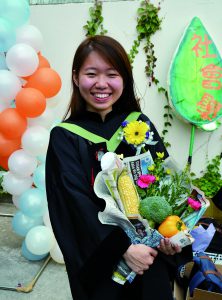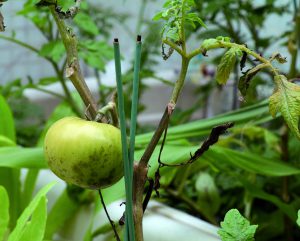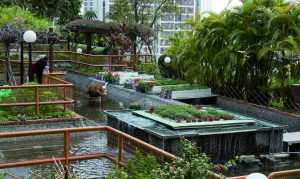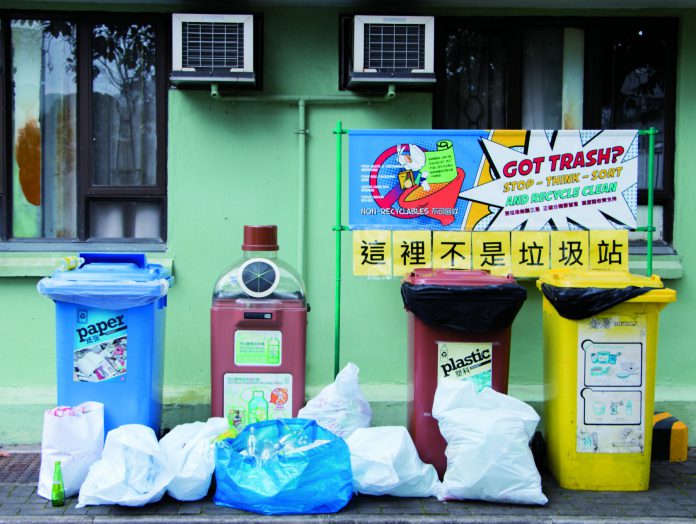Carrots and sticks are needed to motivate people to change their non-green habits
by Maggie Suen & Fiona Chan
On the “photo day” to celebrate her graduation from university last year, Sandy Lee Mei-shan who is now 22, was delighted to be given a very special bouquet. While other students had their arms full with elaborate floral arrangements wrapped in layers of paper and adorned with ribbons, Lee proudly held a vegetable bouquet made up of broccoli, yellow peppers, and sweetcorn wrapped in newspaper. To Lee it was a sign that her friends acknowledged her commitment to green values and put them into action.
Lee did receive flowers, but she made sure she used some of them to make environmentally friendly floral enzyme detergent while others became dried flowers. As a core member of CU X Rubbish, a green organisation established in 2013 at the Chinese University of Hong Kong, Lee does not just talk the talk, she walks the walk.

The group hopes to minimise waste at the university and one of their best-known activities is the Annual Hostel Check-out Recycling Scheme. Members collect items such as cooking utensils, clothes hangers and bedding that are no longer used at the end of a semester, and reserve them for their free second-hand goods exchange platform at the beginning of the next semester.
Their push to reuse second-hand materials has helped to reduce the amount of waste generated when students leave their hostels but Lee says many students only visit their booths to get stuff for free. They show little interest in listening to the group’s sharing and tips on how to reduce waste on a daily basis.
Lee’s experiences illustrate a common tendency to pay lip-service to or take advantage of efforts to encourage environmentally friendly living without a change in lifestyle.
Adrian Kwong Chi-hang, 25, finds himself facing similar difficulties to Lee. Kwong has worked in a multinational publishing company for two years. He has been concerned about the environment since he was a teenager and is acutely aware of many environmentally irresponsible practices in his workplace.
For instance, all printers in the office are set to print on single sides by default, and many of his colleagues simply dispose of used or even blank sheets of paper in regular bins instead of recycling bins. He also notices the huge amount of rubbish generated during lunchtime. Recyclable takeaway containers and utensils are tossed after lunch and the pantry bins are always overflowing. Those who bring their own lunches leave the tap water on continuously when they wash their lunch boxes; they use a lot of detergent and many paper napkins to clean one single container.
So Kwong took it upon himself to clean and collect all the recyclables from the pantry bins as well as the bins near each colleague’s seat before the cleaners came to clear them. After work, he takes the items to residential estates with credible established recycling programmes. He also makes sure one of the three pantry bins is always empty to save one plastic rubbish bag each day.
Kwong’s efforts have proved to be constructive as he has reduced three full bins of rubbish by half each day. However, in the two years of his voluntary green service in the office, none of his colleagues have ever joined him. There are a few who have voluntarily reduced the amount of waste they produce and give him their recyclables but the majority still fail to understand his motives or even see his practices as unhygienic.
“Whether or not I am at work makes an obvious difference [in the office],” Kwong says.
Despite his frustration, Kwong struggles on as this work makes him feel better about himself. That is not to go so far as to say he enjoys it. He shakes his head when he says: “I wake up every morning realising it is another day for me to do this work again. In a utopian, ideal world, there would be no need for me to do such things.”
Kwong does not want to describe what he does as being a contribution to “environmental protection” because he rejects the term. He thinks it makes people view humankind and nature as opposing forces.
“Environmental awareness should refer to… knowing the existence of other species for the normal operation of the earth, and humans to live on equal terms with other species.”
Kwong warns that unless we change the way we live, he will not be surprised if each district of Hong Kong has its own landfill in the future.
He has reason to be pessimistic. In a survey of 543 people aged between 11 and 61 or above, Varsity asked people to rate their awareness and knowledge of environmental issues, as well as their daily habits. The results showed Hong Kong citizens did not have a common habit of recycling on a regular basis.
On a scale of 1 to10, the average rating for environmental awareness was 5.64. However, 60 per cent of respondents said they did not regularly use the three colour waste recycling bins. More than half of them said they always or often recycled waste materials only if there were easily accessible waste separation bins.
The survey also found just 34 per cent of respondents knew that food waste constitutes the largest proportion of the waste disposed in Hong Kong’s landfills, making up around 40 per cent of municipal solid waste in 2014, according to a report by the Environmental Protection Department. Household food waste alone amounts to 2,608 tonnes per day.
In 2012, the government launched the Food Wise Hong Kong Campaign to increase awareness of the food waste problem and encourage behavioural changes in the community at individual and household levels to combat it.
But while Varsity’s poll found that 90 per cent of the respondents knew about the Food Wise Hong Kong Campaign, more than 50 per cent of them gave the scheme a rating of less than 5 out of 10 in encouraging them not to order more food than they needed. In other words, it failed to motivate them to change their habits.
Vincent Law King-man, executive director of Greeners Action, says he believes the reason the campaign has been so ineffective in changing people’s behaviour is that there are no laws to motivate people to change. That is, they do not have to pay for their waste.
“I think it would work if we make use of legislation to raise their [citizens’] awareness,” he says. Law thinks that together with education, legislation could be what is needed to push people to turn their awareness into action.
Francis Ngai Wah-sing, founder of Social Ventures Hong Kong (SVHK) and co-founder of Green Monday, has a different view. He prefers carrots to sticks and suggests introducing incentives for people to change their habits.
Ngai’s Green Monday project is a social start-up under SVHK to promote green, healthy and sustainable living through encouraging people to give up meat on Mondays.
He says Green Monday stresses the importance of making first steps.
For instance, tasty plant-based menus could be provided as incentives to persuade people to take “baby steps to go green”. Many restaurants, schools, government departments and the Legislative Council have worked with Green Monday and embraced its idea. Ngai describes it as “earth day every week” and says it is a start in raising people’s awareness.
“All people will tell you environmental protection is right. They know how to do it, and do it conveniently,” says Ngai. “But how many would stay committed to a daily habit of doing it? Awareness is not the most important matter now. It is more important for us to find easy approaches for action.”
The key, for Ngai, is to offer people convenient, fun and innovative ideas to help save the planet. SVHK is also working on Bottless, a project to encourage people not to use disposable plastic bottles. The team wants to launch a Bottless map, to show people where they get access to free water refill stations in offices and restaurants. People would then bring their own bottles and refill their water at participating sites across the city.

“I think the problem is not a lack of knowledge, but how to find an easy way [to achieve what we know],” Ngai says.
These efforts are commendable, but for Edward Yiu Chung-yim, an associate professor in the Department of Geography Resources Management at the Chinese University of Hong Kong, they do not go far enough.
Yiu questions the prevailing notions of environmental protection.
“It is very pathetic to believe that you have already saved the earth after you recycled the rubbish you have created,” he says, adding that people often dismiss the importance of reducing consumption to achieve environmental protection.
For Yiu, the way to solve the problem thoroughly is to reduce waste at the source. However, he says the government is reluctant to promote this message because it usually takes the interests of business into account when promoting environmental protection.
He says this can be seen in the government’s common practice of encouraging people to buy environmentally friendly products.
“You are buying new products while throwing away old ones. That is what we regard as ‘fake environmental protection’,” he says. “On the surface, you have reduced carbon emissions, but in fact some new interest groups profit in the process.”
Reducing consumption poses a threat to the economy and Yiu believes this is why governments and businesses around the world spread what he says is a misleading concept of environmental protection.
“They are deliberately releasing incomplete information because they don’t want people to reduce consumption,” he says.

Yiu acknowledges there is a need to balance environmental protection with economic development, but this is no easy task. Therefore, education should take priority in the long run.
“It is important to know the truth which the authorities are hiding from you first. Putting things into action is another matter,” he says.
Yiu put forward his vision for environmental sustainability in a 2013 conference paper outlining a framework for “four zeros”– zero waste of energy, zero waste of food, zero waste of water and zero waste production.
To put his ideas into action he launched the “Four Zero Scheme” in Chi Fu Fa Yuen, where he lives, by forming a green group. Members have introduced an aquaponics system and organic farming on the estate. There is also a corner where people can share one copy of a newspaper and ride a bicycle to generate electricity.
You could say this is his version of Green Monday founder Francis Ngai’s baby steps. Yiu describes it as a social experiment which shows how a city can be sustainable through generating its energy and making use of the waste it produces. He hopes the project can become a model for other residential estates in Hong Kong and encourage us all to reduce waste at the source.
Edited by Kelly Wong











































